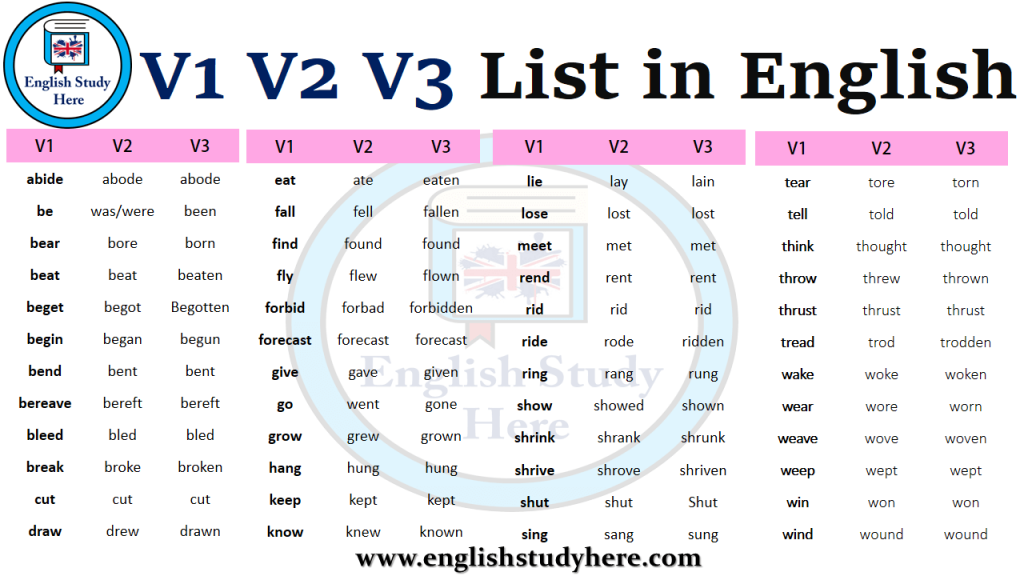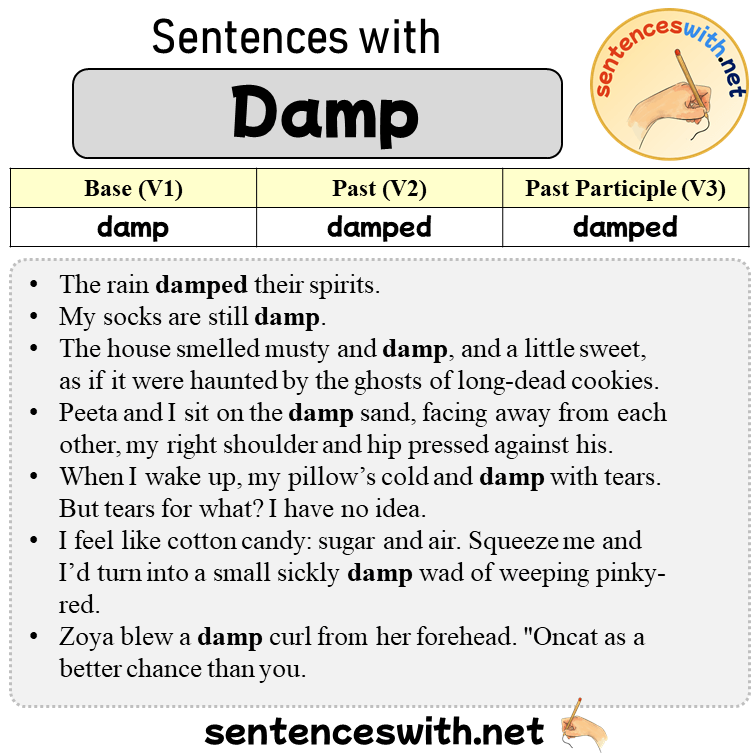
Past Tense of Set, Past Participle of Set, V1 V2 V3 V4 V5 Form of Set
Put Past Simple, Past Participle, V1 V2 V3 Form of Put Verb; Put Meaning; place, set, lay, put down, lay down V1, V2, V3, V4, V5 Form of Put Base Form Past Form Past Participle put put put Base Form s/es/ies ing Form put puts putting Synonym for Put place set lay put down lay down accommodate deposit domicil domicile draw out sting insert thrust tuck in throw toss throw away cast shoot leave.

Put V1 V2 V3 V4 V5 , Past Tense, Past Participle Form of Put
Put V1 V2 V3, Put Past and Past Participle Form Tense Verb 1 2 3. Table of Contents. put; Synonyms; Example Sentences with put; put. Meanings; Move to or place in a particular position.(verb) Bring into a particular state or condition.(verb) Throw (a shot or weight) as an athletic sport.(verb)

Past Tense of Install, Past Participle of Install, V1 V2 V3 V4 V5 Form
Put Verb Forms (V1, V2, V3, V4, V5): BASE FORM: PAST TENSE: PAST PARTICIPLE-S/IES-ING: put: put: put: puts: putting: Example Conjugations: Present Tense. In present tense conjugations, we typically use the verb "to+V1". Here are some conjugations of "to+V1" in the present tense: I + put: She/He + puts:

V1, V2, V3 Present Tense, Past Tense & Past Participle English
Put V1 V2 V3 V4 V5 is one of the verbs that are used very commonly in English tests as well as in everyday communication.Also, because it's an irregular verb, put doesn't follow the regular rule.The verb "put" has five different forms: base form, past simple, past participle form, present perfect, and present perfect participle.So what is put's past?

Set Past Simple, Simple Past Tense of Set Past Participle, V1 V2 V3
This verb is used in V2 form if Past Tense is mentioned in the sentence. Since it is one of the irregular verbs, in V2 the word doesn't take a piece of jewelry, but in some irregular verbs, there is a different situation. Just as with the verb read, the V2 form of this verb is the same; again, it is ' put '. Each subject has almost.

V1 V2 V3 Examples English Study Here
V1 Base Form (Infinitive): To Put: V2 Past Simple: Put: V3 Past Participle: Put: V4 3rd Person Singular: Puts: V5 Present Participle/Gerund: Putting: Irregular Verbs Following a Similar Pattern Verbs like: V1 Base Form V2 Past Simple

PUT VERB forms v1 v2 v3 put vs putted YouTube
Put Past Simple, Simple Past Tense of Put, Past Participle, V1 V2 V3 Form Of Put When learning English you need to know the meaning of certain words first, and then sort the words appropriately according to grammatical rules. Verbs in a regular structure can be transformed with a simple rule, whereas in irregular verbs, this situation is slightly different. It may be a good start to make some.

Put Past Tense, Present and Future Conjugations, Put V1 V2 V3 Past
Verb form V2, the Past form of Verb, refers to an action/event that happened in the past. Usually, the past form of a verb is formed by adding "- " to the end of the root verb. For example: If a root verb ends with the letter " ," we only add "-. . For instance, verbs like. On the other hand, verbs such as "go" change completely.

Put Past Simple, Past Participle, V1 V2 V3 Form of Put English Vocabs
Learn the three forms of the English verb 'put'. the first form (V1) is 'put' used in present simple and future simple tenses. the second form (V2) is 'put' used in past simple tense. the third form (V3) is 'put' used in present perfect and past perfect tenses.

Past Tense Of Put, Past Participle Form of Put V1 V2 V3 Lessons For
This list contains all the irregular verbs of the English language. Each entry includes the base or bare infinitive first, followed by the simple past (V2) form and the past participle (V3) form. Taking some time to make sentences using each irregular verb form will help you to use these verbs correctly when speaking and writing.

Put Past Simple, Past Participle, V1 V2 V3 Form of Put English Vocabs
Put V1 V2 V3 V4 V5, Past Simple and Past Participle Form of Put Verb; Put Meaning; place, set, lay, put down, lay down V1, V2, V3, V4, V5 Form of Put Base Form Past Form Past Participle put put put Base Form s/es/ies ing Form put puts putting Synonym for Put place set lay put down lay down accommodate deposit domicil domicile draw out sting insert thrust tuck in throw toss throw away cast.

V1 V2 V3, Definition, Examples and Detailed List English Grammar Here
Put verb forms V1 V2 V3 V4. Infinitive Past Simple Past Participle Present Participle; Put: Put: Put: Putting: Conjugation of Put. Simple / Indefinite Present Tense: I put all eggs in the basket. He/She/It puts all eggs in the basket. You/We/They put all eggs in the basket. Simple Past Tense:

V1 V2 V3 List English Study Here
Past Tense of Put. The verb ' put ' is a verb that we often see in sentences. In addition, it is also a word that you will use a lot when talking and writing. For this reason, it is useful to know how to change it with different time forms when using it. We will also be giving you sample sentences with the use of V2 and V3 states.

verb forms of PuT verb forms in V1,V2 ,V3,V4,V5 shorts ytshorts
Meaning: to push or place something somewhere, usually so that it stays there for a period of time Put Verb Forms V1 V2 V3 V4 V5 Base Form/Infinitive (V1): Put Past Tense (V2): Put Past Participle Form (V3): Put Present Participle/Gerund (V4): Putting 3rd Person Singular (V5): Puts Put Past Tense: Past Tense of Put is Put. Example: Sarah put the pen.

V1V2V3 (PUT TYPE) YouTube
V1, V2, V3, V4, and V5 refer to the five different verb forms. V1 is the base form of the verb; V2 is the simple past form; V3 is the past participle form; V4 is the third-person singular present form; and V5 is the present participle form. The following section has a list of regular verbs and irregular verbs in their various forms.

Sentences with Put, Past and Past Participle Form Of Put V1 V2 V3
https://englishtivi.com/put-v1-v2-v3-v4-v5-base-form-past-simple-past-participle-form-of-put/Put V1 V2 V3 V4 V5 Base Form, Past Simple, Past Participle Form.